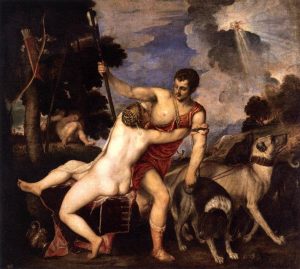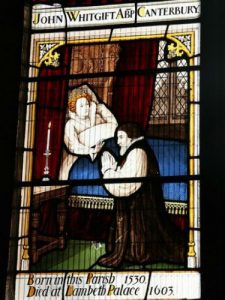Establishing that Joseph Hall was the earliest Shakespeare authorship doubter is underway. The poems he is attacking are heroic in nature, use hyphenated adjectives, and begin many lines with ‘But’ and ‘O’. There are two other distinctive characteristics referred to by Hall which are rarely if ever mentioned by commentators in this debate.
The first is his observation:
Phoebus filled him with intelligence:
He can implore the heathen deities
To guide his bold and busy enterprise.
Shakespeare is by no means alone among Renaissance writers who regularly invoked the names of Greek and Roman deities in his work, having been influenced by the ancient poets at the centre of a humanist Renaissance education. But Venus and Adonis is prominently fronted by a quote from Ovid that very specifically invokes Apollo, also known as Phoebus, asking the ancient god of music, poetry, art, sun, light and knowledge very specifically to ‘guide… his enterprise’:
Vilia miretur vulgus; mihi flavus Apollo
Pocula Castalia plena ministret aqua.
which Marlowe translated as
Let base conceited wits admire vile things.
Fair Phoebus lead me to the Muses’ springs.
The second rarely quoted quality of works by ‘Labeo’ that Hall mentions is that they owe a debt to Petrarch. Hall observes that the author can ask for Phoebus’s guidance (as Shakespeare does in Venus and Adonis)
Or filch whole pages at a clap for need,
From honest Petrarch, clad in English weed.
Lynne Enterline notes how the post-rape scenes in Shakespeare’s The Rape of Lucrece are essentially stolen from Petrarch’s canzone delle metamorphosi.[1]
- After she is raped, ‘Lucrece shares with Petrarch a keen sense of her want of verbal skill.’ Both Shakespeare and Petrarch ‘represent such self-alienation in language by summoning Ovidian characters (Actaeon and Philomel)’.
- Shakespeare mirrors Petrarch’s language exactly: where Petrarch expresses alienation from himself as ‘Non son mio, no’ — ‘I am not my own, no’, we are told of Lucrece that ‘She is not her own’.
- A taboo against speaking provokes the poet of Petrarch’s narrative to call for pen and paper: ‘ond’io gridai con carta et con inconstro’— ‘whence I cried out for paper and ink’. This sentiment, too, is mirrored exactly by Shakespeare: Lucrece, finding spoken language of no use to her, calls to her maid: ‘Go get me hither paper ink and pen’.
Thus Hall, in his declaration of the two alternative actions that Labeo can take to write verse that (as he admits) reaches the ‘true strains’ of heroic poetry, exactly pinpoints two actions that Shakespeare took in the only works published under that name when Hall was writing; invoking Apollo/Phoebus to guide the writing of Venus and Adonis, and ‘filch[ing] whole pages from Petrarch’ in The Rape of Lucrece.
And there is one more identifying mark from Hall.
[1] Lynne Enterline, The Rhetoric of the Body from Ovid to Shakespeare (CUP 2006), p.171-4.
Click Here to Subscribe and we’ll notify you about new content.


